The Uncrowned Kings
Written by: H.A.K. Walijah
Who could be from the Forties till the late Eighties charmed the film world with his scintillating lyrics in about 200 films and Rafi Saab had sung at least 225 songs out of 1800 recorded songs penned – guess whom I am referring, yes it is Hasrat Jaipuri, “The King of Romance”. Hasrat Jaipuri is one of the best lyricists in Bollywood who have been in the Indian film industry for a long time. The lyricist is now being considered as an iconic figure in the Bollywood music world. The verses which came out of his pen were realistic, rhythmic and touched the soul. He spread the fragrance of his poetry during 50’s & 60’s with his brilliant poetic genius comprising some of the sweetest melodies sung by “The King of Melody”, Mohammad Rafi Sahab – “Teri pyari pyari soorat ko” (Sasural), “Tu kahan yeh bataa” (Tere Ghar Ke Saamne), “Tu mere saamne hai, teri zulfein hai khuli” (Suhagan), “Ehsan tera hoga mujh par” (Junglee), “Teri zulfon se” (Jab Pyar Kisise Hota Hai) and “Tum mujhe yoon bhula na paaoge” (Pagla Kahin Ka).
One cannot but accept that the maestro was right as he wrote once, “Tum mujhe yoon bhula na paaoge / Jab kabhi bhi sunoge geet mere/ sang sang tum bhi gungunaaoge/ Haan, tum mujhe yoon bhula na paaoge.” Hasrat Jaipuri was one of the best lyric writers of all time. There is no better writer when it comes to romantic songs, no one could match him in this aspect. He had a natural talent in writing for this genre. He wrote one of the top most romantic songs ever, “yeh mera prem patra padh kar” (Sangam). Hasrat Sahab was expert in composing romantic songs. He had no peer when it came to romantic songs, he was in a class of his own in the shayari world.
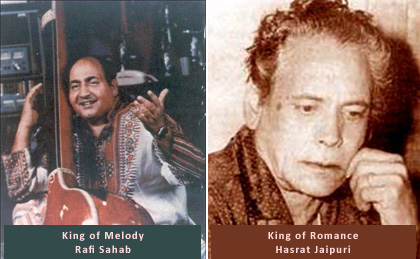
Mohd Rafi and Hasrat Jaipuri
Hasrat Jaipuri was born on April 15, 1922 as Iqbal Husain in Jaipur; he acquired his studies in Urdu and Persian from his grandfather. He began writing verse when he was around twenty years old. In 1940 Hasrat Jaipuri came to Bombay, earned livelihood by working as bus conductor and satiated his creative urges by participating in poets’ gathering (mushairas). In one of the mushairas, Prithviraj Kapoor noticed Hasrat reciting ghazal and recommended him to his son, Raj Kapoor. Thus Hasrat got his big break with Raj kapoor in Barsaat. The first song recorded by Hasrat Jaipuri was “Jiya beqarar Hai” which was sung by the Nightingale of India – Lata Mangeshkar; and Shanker Jaikishen was the first musician with whom he had worked at the beginning of his film career. Rafi Saab had sung the first song of Hasrat was “Main zindagi main har dam rota hi raha hoon” from the same movie Barsaat. He collaborated with RK Films till the end of 1971. Hasrat Jaipuri was known for his simple and poetic lyrics, he was one of the most influential songwriters in the history of Indian cinema. Along with fellow lyricist – Shailendra wrote lyrics for the films of Raj Kapoor till 1971 (Mera Naam Joker).
When we discuss about Hasrat Sahab and Rafi Sahab, how could one miss to mention Shankar Jaikishan name, the greatest music duo ever graced to the Hindi film world without which, I think, this article may not be considered as complete. Mohd. Rafi Sahab got six Film Fare Awards out of which 3 were for Shankar-Jaikishan songs. Hasrat Jaipuri got all his Film Fare Awards for S-J songs. Shankar Jaikishan created everlasting and immortal melodies in fifties and sixties which is considered to be the golden era of Hindi cinema.

Shankar-Jaikishan
Most of Hasrat’s poetry under the baton of Shankar Jaikishan was sung by Rafi Sahab starting from Barsaat (1949) till Andaz (1971). Hasrat Jaipuri songs had perfectly reflected the persona of Shammi Kapoor, Dev Anand, Dharmendra, Rajendra Kumar, Sunil Dutt, Jeetendra, Raaj Kumar, Shashi Kapoor, Joy Mukherji, Biswajeet, Manoj Kumar and Guru Dutt for whom Rafi Sahab had given the playback in some of the wonderful songs. Hasrat was a romantic poet without being pompous or verbose. He weaved his own romantic feelings into his lyrics, i.e. he was more a subjective poet comparatively. Rafi Saab had sung at least 225 songs penned by Hasrat Jaipuri. Some of the best and all time greats by The Two Kings: Mohammad Rafi Sahab and Hasrat Jaipuri are –
- Falsafa Pyaar Ka
- Gar Tum Bhula Na Doge
- Ehsaan Tera Hoga
- Teri Pyaari Pyaari Surat Ko
- Baharon Phool Barsao
- Jo Guzar Rahi Hai Mujhpar
- Tumse Achcha Kaun Hai
- Meri Muhabbat Jawaan Rahegi
- Ek But Banaaoonga
- Taqdeer Ka Fasaana
- Tu Mere Saamne Hai
- Dil Ka Bhanwar Kare Pukaar
- Gham Uthaane Ke Liye
- Tum Mujhe Yun Bhula na
- Yeh Aansoo Mere Dil Ki
- Yeh Mera Prem Patra Padh Kar
- Aaye Bahaar Ban Ke Lubha Kar
SHAMMI KAPOOR: Hasrat Jaipuri collaborated his life best poetry with Shankar-Jaikishan, vocals provided by Rafi Sahab for the successful actor – Shammi Kapoor, hailed to be the ‘Elvis Presley of India’, is one of the finest actors that Bollywood has ever produced. He was the leading star of Bollywood during the late 1950s as well as the 1960s. He delivered hits like ‘Junglee’, ‘Professor’, ‘Rajkumar’, ‘An Evening In Paris’, ‘Bramhachari’, and ‘Andaaz’. Mohammed Rafi Sahab was his most preferred choice as his playback voice. Some of the super hit songs for Shammi Kapoor vocalized by Rafi Sahab, lyrics penned by Hasrat Jaipuri and fantastic musical compostions by Shankar-Jaikishan: –

Rafi Saab, Shankar & Shammi Kapoor
- Ahsan tera hoga mujh par (Junglee)
- Yahoo koi mujhe junglee (Junglee)
- Aya yya suko suko (Junglee)
- Khuli palak main (Professor)
- Aye Gulbadan (Professor)
- Dil le gayi (Laat Saheb )
- Salaam aapki meethi nazar (Boy Friend)
- Mujhe Apna Yaar Bana Lo (Boy Friend)
- Jane mera dil Kise (Laat Saheb)
- Savere wali gaadi se (Laat Saheb)
- Is rang badalti diniya main (Rajkumar)
- Haseen ho tum khuda nahin (Budtameez)
- Hoga tum se kal bhi saamna (An Evening in Paris)
- Aasman se aya farishta (An Evening in Paris)
- Dil ke jharoke main (Bramhchari)
- Badan pe sitare (Prince)
- Tu bemisaal hai tarif kya karoon (Bramhchari)
- Tum mujhe yun bhula na (Pagla Kahin ka)
- Janam Janam ka Saath (Tumse Achcha Kaun Ha)i
- Meri Mohabbat Jawan Rahegi (Janwar)
- Tumse Achchha Kaun Hai (Janwar)
- Jab Mohabbat Jawaan Hoti Hai (Jawan Mohabbat)
RAJENDRA KUMAR: The 1960s saw Rajendra Kumar rise like no other star had risen, and there was a time when every film starring him was a silver jubilee hit. There were times when he had six or seven films running in their silver jubilee weeks at the same time. It was a success that was unbelievable and Rajendra Kumar was soon known as “Jubilee Kumar”. No other actor has had as many silver and golden jubilees, sometimes in a row. Rajendra Kumar had an incredible six consecutive hits with not a single flop between late 1963 to 1966: Mere Mehboob [1963]; Zindagi, Sangam and Ayee Milan Ki Bela [all 1964]; Arzoo [1965] and Suraj [1966]. The ’60s saw films like “Sasural”, “Dil Ek Mandir”, “Aayi Milan ki Bela”, “Sangam”, “Zindagi”, “Aarzoo”, “Suraj”, “Aman”, “Jhuk Gaya Aasman”, “ Dharti”. Rajendra Kumar has left behind a rich legacy. It was Rajendra Kumar who with his long list of hits can be called a superstar in the true sense of the term.
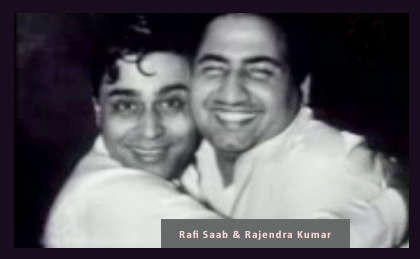
Rafi Saab & Rajendra Kumar
- Teri pyari pyari surat ko (Sasural)
- Main Pyar Ka Deewana ( Ayee Milan Ki Bela)
- Tum kamsin ho, naadan ho (Ayee Milan Ki Bela)
- Bura Maan Gaye (Ayee Milan Ki Bela)
- Yeh mera prem patra padhkar (Sangam)
- Aye phoolon ki rani (Aarzoo)
- Chalke jo teri aankhon se (Aarzoo)
- Ae Nargis mastana (Aarzoo)
- Baharon phool barsaon (Suraj)
- Chehre pe giri zulfein (Suraj)
- Aaj ki Raat ye kaisi (Aman)
- Ae Husn pari Chehra (Aman)
- Aman Ka Farishta (Aman)
- Surahidar Gardan Koyel Si (Aman)
- Yaad na jaye bite dinon ki (Dil Ek Mandir)
- Pehle Mile The Sapno Mein (Zindagi)
- Teri Zulfon se judai to nahin (Zindagi)
- Kaun hai jo sapnon main aaya (Jhuk gaya aasman)
- Upar Dekho Ya Neeche Aage Dekho (Aan Baan)
- Jab Tum Ho Mere Humsafar Khubsurat (Aan Baan)
- Naam Nahin Koii Dhaam Nahin (Aan Baan)
DEV ANAND: Dev Anand is amongst the most distinguished actors of the Indian film industry. At the time when his stardom was at its pinnacle, Dev Anand was considered the most suave among his contemporaries. Think Dev Anand and it conjures up memories of the romance, youth, flamboyance, style and class of a bygone era. The evergreen romantic superstar of Bollywood who entertained us with movies like ‘Guide’, ‘Kala Pani’, ‘Jewel Thief’, and ‘Hare Rama Hare Krishna’ never failed to cast his magic spell on the enthralled spectators. When we come to think of Hasrat Jaipuri penned lyrics for Dev Anand vocalized by Rafi Saab, can hardly remembered the movies like Love Marriage (1959); Jab Pyar Kisi se hota hai (1961); Asli Naqli (1962); Tere Ghar ke Saamne (1962); Pyar Mohabbat (1966); Duniya (1968)
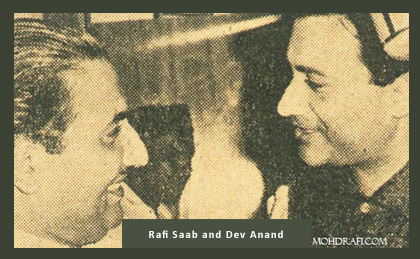
Rafi Sahab and Dev Anand
- She ne khela he se (Love Marriage)
- Jiya o jiya zara (Jab pyar kisi se hota hai)
- Teri zulfon se judai (Jab pyar kisi se hota hai)
- Sau saal pehle (jab pyar kisi se hota hai)
- Cheda Mere Dil Ne (Asli Naqli)
- Ek but banoonga aur (Asli Naqli)
- Kal Ki Daulat (Asli Naqli)
- Tujhe Jevan Ki Dor Se (Asli Naqli)
- Gori Zara Has De Tu Has De (Asli Naqli)
- Tere ghar ke samne (title song)
- Tu kahan yeh bata (Tere ghar ke saamne)
- Dil ka bhanwar kare pukar (Tere ghar ke saamne)
- Doobte Huye Dil Ko (Kahin aur chal)
- Aap Naaraaz Khuda Khair Kare (Pyar Mohabbat)
- Sun sun sun re balam rafi (Pyar Mohabbat)
- Falsafa Pyar Ka Tum Kya Jaano (Duniya)
- Jawan Tum Ho Jawan Hum Hain (Duniya)
DHARMENDRA: Dharmendra was noticed for his looks and soon received his first role in 1960’s Dil Bhi Tera Hum Bhi Tere, beginning with a string of romantic films through the sixties. The formula became a success and the actor was quickly paired with the leading ladies of the day like Nutan, Mala Sinha and Meena Kumari. The actor was also seen in Hrishikesh Mukherjee’s Satyakam, considered his finest acting performance.
Yet Hasrat Jaipuri & Shanker-Jaikishan also came up with Rafi memorabilia in some half-a-dozen solos that they did for the actor Dharmendra, beginning with
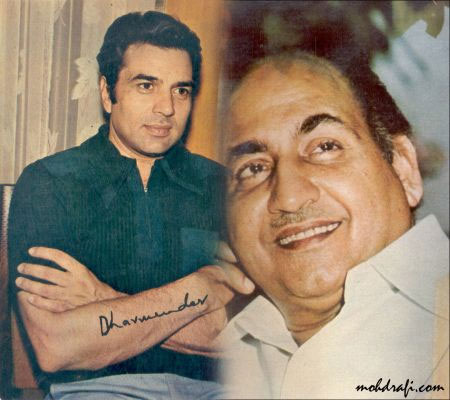
Mohd Rafi and Dharamendra
- Tumhare pyar mein hum beqaraar hoke chale (Shikar)
- Main kahin kavi na ban jaoon (Pyar hi pyar)
- Dekha hai teri aankhon main (Pyar hi Pyar)
- Yakeen kar lo mujhe mohabbat hai tumse tumse (Yakeen)
- Baharon ki baraat aa gayi (Yakeen)
- Gar tum bhula no doge (Yakeen)
- Chehra Tera Allah Allah (Tum Hasin Main Jawan)
SUNIL DUTT: Sunil Dutt was one of the most acclaimed and talented Bollywood actors of all times. He also indulged himself in producing and directing films. Sunit Dutt was one of the stars reigning over Bollywood in the 1950s and 1960s. He appeared in a number of box-office hits, including ‘Sadhna’ (1958), ‘Sujata’ (1959), ‘Mujhe Jeene Do’ (1963), ‘Khandaan’ (1965) and ‘Padosan’ (1967). Three movies where Rafi Sahab, Hasrat and Shanker Jaikishan created magic:

Sunil Dutt and Rafi Sahab
- Ehsan Mere Dil Pe Tumhara Hai (Gaban)
- Sola Singar Karke Aai Suhaag Raat (Gaban)
- Radhike tune bansuri bajayee (Beti Bete)
- Aaj kal main dhal gaya (Beti Bete)
- Mere mehboob tere dum se (Bhai Bhai)
- Ek tera sundar mukhda (Bhai Bhai)
JEETENDRA: The ‘Jumping Jack’ of Bollywood, Jeetendra was one of the actors who wooed the Indian audience in the 1970s and 1980s. Touted to be the dancing star of his time, he was an extremely successful star of commercial films. Some of the hits the trio created are
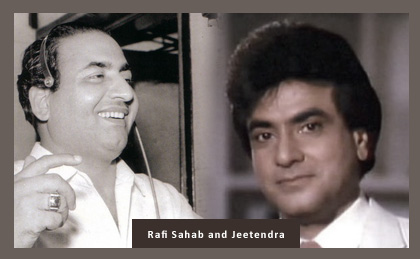
Mohd Rafi with Jeetendra
- Rukh se zara naqab (Mere Huzoor)
- Gham uthane ke liye (Mere Huzoor)
- Hamko To Barbad Kiya Hai (Gunahon Ka Devta)
- Dar lage to gaana gaa (Yaar Mera)
- Haye kuch aisi ada se wo (Yaar Mera)
MEHMOOD: Such was Mehmood’s impact on the Hindi film scene that at the peak of his career in the late 60s and early 70s, leading heroes of Bollywood began refusing to work with him as they were afraid of being overshadowed. Perhaps there was some truth behind this – Gumnaam (1965) for all its fine ensemble cast is primarily remembered for Mehmood and his signature song – Hum kaale hain to kya hua dilwaale hain

Mehmood and Rafi Sahab
- Main Marne Chala Hoon (Gunahon Ka Devta)
- Hum kaale hain to kya hua (Gumnaam)
- Zindagi Mujhko Dikha De Rasta (Sanjh Aur Savera)
- Main hoon jaani tera (Bhai Bhai)
- Baat Itni Si Hai keh do (Beti Bete)
- Gori Chalo Na Hans Ki Chaal (Beti Bete) Rafi and Asha
- Wo Din Yaad Karo (Hamrahi) Rafi and Lata
JOY MUKHERJI: Joy Mukherjee is best remembered for the romantic musicals he starred in during the early 1960s. For a few years in the 1960s he was one of the kings of Bollywood light romances. In films like “Love in Simla” [1960], “Phir Wohi Dil Laya Hoon” [1963], “Ziddi” [1964] “Love in Tokyo” [1966], “Shagrid” [1967].
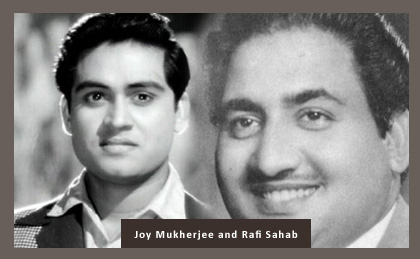
Joy Mukherjee and Mohd Rafi
- Japan, love In Tokyo (Love in Tokyo)
- Aa Ja Re Aa Zara Aa (Love in Tokyo)
- Mere Shahe-Khuban (Love in Tokyo)
- Jaanoon Kya Mera Dil Ab (Ziddi)
- Pyaar Ki Manzil Mast Safar (Ziddi)
- Teri Surat Se Nahin Milti Kisiki Surat (Ziddi)
Some of the finest melodious songs sung by Rafi Sahab penned by Hasrat jaipuri for Biswajeet, Raaj kumar, Shashi Kapoor, Manoj Kumar, Uttam Kumar, Guru Dutt, Pradeep Kumar and Sanjeev Kumar. The songs are shortlisted here –
Biswajeet
- Meri mohabbat pak mohabbat (April Fool)
- April fool banaya (April Fool)
- Jane Kaha Dekha Hai (Biwi Aur Makan)
- Ae Jaane Man (Hare Kanch Ki Chooriyan)
Shashi Kapoor
- Hum ko jaan se pyari hain (Naina)
- Chale Ja Chale Ja Jahan Pyar Mile (Jahan Pyar Mile)
- Jawani Mast Hai Dagar Zara (Vachan)
Raaj Kumar
- Jo guzar rahi hai mujh par (Mere Huzoor)
- Unke khayal aaye to aate (Lal Pathar)
Johnny Walker
- Tirchi Nazar Se Yoon Na Dekh (Ek Phool Chaar Kante)
- Tu Hi Meri Laxmi (Duniya)
Uttam Kumar
- Aye chand ki zebai (Chhoti si mulaqat)
Manoj Kumar
- Ek Ladki Hai Jisne (Gumnaam)
Guru Dutt
- Tu Mere Samne Hai (Suhagan)
- Mere Pyaar Mein Tujhe Kya Mila (Suhagan)
Pradeep Kumar
- Phool Sa Chehra Chand Si Rangat..(‘Raat Aur Din)
Sanjeev Kumar
- Jane Kis Roop Ki Jadu (Archana)
Rafi Saab won three Film Fare Awards for the songs of Hasrat Jaipuri with musical compostion of Shankar-Jaikishan :
- 1961 – Teri Pyari Pyari Surat kor – (Sasural)
- 1966 – Baharon Phool Barsaao – (Suraj)
- 1968 – Dil Ke Jharoke Mein Tujko Bithakar – (Brahmachari)
Hasrat Jaipuri won two Film Fare Awards in his lifetime for writing beautiful lyrics:
- 1966 – Baharon phool barsao (Suraj)
- 1971 – Zindagi ek safar hai suhana (Andaz)
Some of Hasrat Jaipuri’s best remembered duets sung by Rafi Sahab with other singers are shortlisted below:
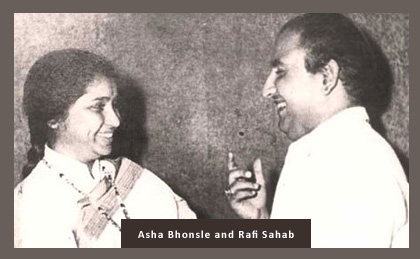
Asha Bhonsle and Rafi Sahab
- Dil Tera Diwana Hai Sanam (title song) Rafi and Lata
- Awaz De ke hamein tum bulao (Professor) Rafi and Lata
- Din Sara Guzara Tore Angana (Junglee) Rafi and Lata
- Dheere dheere chal chand (Love Marriage) Rafi and Lata
- Tujhe Jeevan Ki Dor Se (Asli Naqli) Rafi and Lata
- Gori Chalo Na Hans Ki Chaal (Beti Bete) Rafi and Asha
- Tumne pukara aur hum chale (Rajkumar) Rafi and Suman
- Yehi hai woh saanjh aur savera (Saanjh aur Savera) Rafi and Asha
- Dil Ki Kitaab Kori Hai (Yaar Mera) Rafi and Suman
- Itna Hai Pyar Tumse Mujhe Mere Raazdaar (Suraj) Rafi and Suman
- Kasie Samjhaaon Badi Nasaamjh Ho (Suraj) Rafi and Asha
- Aaj kal tere mere charche (Brahmchari) Rafi and Suman
- Jaane chaman shola badan (Gumnaam) Rafi and Sharda
- Kya Kya na sahe hum ne (Mere Huzoor) Rafi and Lata
- Panchi Re O Panchi (Hare Kanch Ki Chooriyan) Rafi and Asha
- Tum Meri Ho Mere Siwa Kisi Ki (Aan Baan) Rafi and Lata
- Yeh mausam bheega bheega hai (Dharti) Rafi and Lata
- Hai na bolo bolo (Andaz) Rafi and Asha
- Dil ek mandir hai (Dil Ek Mandir) Rafi and Suman
- Tujhe Pyar Karte Hai (April Fool) Rafi and Suman
- Tujhe Dekha Tujhe Chaha (Chhoti Si Mulaqat) Rafi and Suman
- Ajhoon na aaye baalma (Sanjh aur Savera) Rafi and Suman
- Mujhko Apne Gale (Humraahi) Rafi and Mubarak Begum
- Muskurati Hui Ek Husn Ki (Daman aur Aag) Rafi and Asha
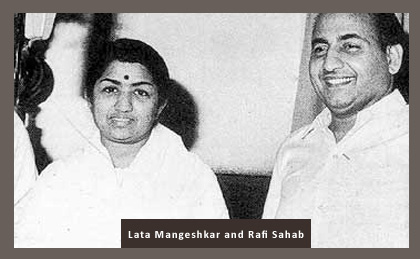
Lata Mangeshkar and Rafi Sahab
Hasrat Sahab stood true to himself when he said –
Mai Shaire e qooban hoon, dil o jaan ki tarah hoon,
Duniya may muhabbath bharey armaan ki tarah hoon,
Allah rakhe ye apni muhabbath yun hi qaayam,
Mai Kal to chala jaonga, mehman ki tarah hoon.
Shortly after Hasrat Jaipuri’s death in 1999, at the age of eighty-one, composer Naushad Saab said, “Hasrat saheb was a good human being and Urdu poet. He was loved by one-and-all in the film industry and was one of the last pillars of the RK Studios.” Hasrat Jaipuri is now not with us, but his ever green lovely songs entertaining millions even today in the voice of Mohammad Rafi Saab.


The poetic zeal and passion appealed to a young film-maker called Raj Kapoor who was in the audience of a stage programme where Shailendra recited his patriotically charged poem Jalta hai Punjab. Raj was making his first film Aag then and he immediately approached Shailendra to ask whether he could write songs for his film. The poet flatly refused the offer saying that his poetry was not for sale!
The birth of his first child Shaily and worsening financial situation finally forced Shailendra to forego any reservations about writing film-songs. After all how long, he could debate with his wife whether they should use one potato for the lunch or for dinner! So he came to the very man, whose offer he had so audaciously turned down. He came to Raj Kapoor who was now in the process of making his second film Barsaat and said, “Now I am in need of money. Is your offer still open?” Raj welcomed him to his fold with open arms. From then onwards, he was to become the permanent member of the famous R.K. musical quartet – Shankar, Jaikishan, Hasrat Jaipuri and Shailendra!
Hasrat Jaipuri and Shailendra were inseparable poets worked together with Shanker Jaikishan. Mr. Walijah has done justice to write an excellent article on Rafi Sahab and Hasrat combination. I would request honorable writers to come forward and write about Shailendra like Mr. Walijah has written in detail. Shailendra was also an important lyricistt who wrote in simple language with wealth of meaning. Shailendra was attached to Shankar what Hasrat to Jaikishan. This team with Rafi Sahab had created wonders in yester years.
reply to post 46 – J.K. Bhagchandani Ji
Please have the details of the song you are curious to know:
Song: aaja ke intezaar mein jaane ko hai bahaar
Singers: Lata Mangeshkar Mohammed Rafi duet
Music: Shankar, Jaikishen
Lyrics: Shailendra
Film: Halaku(1956)
Picturised on : Meena Kumari and Ajit
The write-up is not merely an article, but it is an encyclopedia on combination of two of the greatest kings of H.F.M. Hats off to Shri H.A.K. Walijah for this thoroughly well researched write-up.
Will someone enlighten me if the Rafi-Lata duet from the film ‘Halaku’ (Aa jaa ke intezaar mein…) is written by Hasrat Jaipuri or Shailendra?
J.K. Bhagchandani
This write-up is wonferful and praiseworthy.
the comments from the distinguished rafi fans are fabulous and worth mentioning.
Hats off to Mr. Walijah and the rafi fans.
This is not a website, but a wonderful place to listen the songs of Rafi Saab and read the beautiful articles and express own views. I like this webiste.
Thank you all.
Excellent writting by H.A.K. Walijahji . Thank you sir for yor pains taking effort.
Also the letters of others like Kabeer Amanji are also praise worthy for their knowlwdge and effort.
Kindly carry on the good work ,so that people like me will get one more chance to refresh the memory of those facinating songs of the yester days
I simply love to read all the posts by distinguished rafi fans. Rafi Saab songs are food to the soul. If any hungry person listen this angel songs he might not feel hungry. All songs of rafi saab are soulful and directly penetrating in heart and its effect will live longer. I myself felt so many times.
Long live the legend of legends – Mohd. Rafi Saab.
regards to all rafi lovers
what a wonderful exchange of posts. Its amazing and love of rafi sahab that binds the people from all corner of the world. Rafi saab you are simply great. even some where I heard one couplet I want to write the same thing in this context.
“badla na tere baad bhi mauzoo -e- guftgu
tu jachuka hai phir bhi meri mahfilon mein hai”
My best regards to all rafi fans.
to post 37 – Anees Saab
You are absolutely right in your post. Hasrat Jaipuri used extensively persian phrases which already explained in earlier posts.
Regarding the song of “Aye mere Shah-e-khub, aye meri jaan-e-jaanaana
Tum mere paas hote ho, koi doosra nahi hota”. Hasrat sahab might have borrowed the idea from the Momin shair for which Mirza Ghalib wanted to exchange his complete deewan for this beautiful and wondeful couplet which many rafi fans who are close to literature might have been aware of it.
Each song of Rafi Sahab having depth of meanings, which was the part and parcel of those talented and mighty poets poured in their songs their sweat & blood and made almost immortal pieces for the next generations simply to cherish and preserve that wealth of happiness and stood as role models.
The greatness of Mohd. Rafi Sahab will grow in time to come, then all will recognize this legend when they hear and explore his songs and carry on more research.
Thanks to all rafi fans for glorifying the legend of legends in their articles and posts.
Also I would like to shed some light regarding the song “Aye mere Shah-e-khub, aye meri jaan-e-jaanaana, which was from the movie Love in Tokyo still makes its impact on the music lovers, here again the phrase Shahe khooban comes from Persian phrase which Hasrat used it in a tactfully way. The song was immortalized by the melody king, its pure a magic
“Aye mere Shah-e-khub, aye meri jaan-e-jaanaana
Tum mere paas hote ho, koi doosra nahi hota”.
Which is more likely echoed like Momin Khan Momin shair
Tum mere paas hote ho goya
Jab koi doosra nahin hota
even for this couplet Mirza offered his deewan in exchange.
Even one more famous ghazal Hasrat,
“Unke Khayal aaye to aate chale gaye” from Laal Pathar
which is again very pleasant to listen also rendered by Melody King.
Just this single article lighten up many forgotten things. Amazing!!!
to post 15 Lucky Ji
you are right, Hasrat Sahab always try to add new words in his lyrics – also some persian words, we can add more to the list
chand ki zebai
jaane chaman
shala badan
which altogether brings the freshness to the songs and sweetness to the ears. Indeed Hasrat Jaipuri sahab was a great poet, his songs will be remembred for ages.
One more special thing about his lyrics was mass appealing which later you can find only in Anand Bakshi songs. In this case Hasrat was the pioneer in introducing such persian mixed phrases.
Man Mauji Sahab aur Kabeer Aman sahab, Bahut khoob, Great selection like “Sone pe suhaga”.
Walijah Sahab, Hamare taraf se phir se mubarak bad.
A die hard fan of Rafi Sahab,
Dr. Khaja Aliuddin
to post 32: Kabeer Aman Ji
Your selection of 12 songs is excellent. I go with you
to post 31 – Man Mouji Ji
to Post 32 – Kabeer Aman Ji
I agree for both of your posts and the selection of 12 immortal songs of Kabeer Ji is excellent, those are indeed immortal songs rendered by Melody king – Rafi Sahab.
Hats off to Mr. Walijah for writing and the distinguished commentators whose comments are worth a lot and look as if it were ornaments to the article..
Thank you sirs
moderator ji
I send my post two times, but could not appear in comment column, there is nothing offensive in my post, please publish it.
Raja
Dear Man Mouji Sahab, (post – 31)
I fully agree with your post. I have selected 12 immortal songs which had sung by Rafi Sahab, these songs will live to the eternity and makes Hasrat Jaipuri name live long in the hearts of music lovers
1. “Teri pyari pyari soorat ko” (Sasural),
2. “Baharon phool Barso” (Suraj)
3. “Ye mera prem patra padh kar (Sangam)
4. “Tu mere saamne hai,teri zulfein hai khuli” (Suhagan),
5. “Ehsan tera hoga mujh par” (Junglee),
6. “Teri zulfon se” (Jab PyarKisise Hota Hai)
7. “Dil ke jharoke main” (Bramharchari)
8. “Taqdeer ka fasana” (Sehra)
9. “Falsafa pyar ka tum “ (Duniya)
10. “Dil ka bhanwar kare pukaar” (Tere Ghar ke saamne)
11. “Aaj kal main dhal gaya” (Beti Bete)
12. “Tum mujhe yoon bhula na paaoge” (Pagla Kahin Ka)
Hope my selection will suit to most of the rafians.
As I ponder over more on this article, I came to know some more information about Hasrat Jaipuri which I want to share with rafins. Hasrat wrote his songs in simple language keeping intact the poetic flavour. Every lyricist in those days be it Hasrat, Shakeel, Shailendra or Raja Mehdi Ali Khan had their distinct styles. No one could overshadow anybody or write inferior stuff.
Hasrat Jaipuri loved writing title songs, i.e. songs based on film titles. Writing a title song in those days was a difficult task, one had to keep the entire theme of the film in mind. And it s a record of sorts for Hasrat to have penned nine title songs in a row. Some of them like Deewana mujko log kahen (Deewana (old)), Dil Ek Mandir (Dil Ek Mandir), Raat aur din diya jale (Raat Aur Din), Tere ghar ke saamne (Tere Ghar Ke Saamne) and An evening in Paris (An Evening in Paris).
How far it is true, even amidst his versatility and without being arrogant about it, Hasrat Jaipuri did realize his own worth. ‘Humne who naqsh chhod hai that mywork will always be remembered even after I have gone,”
Some other famous songs penned by Hasrat Jaipuri
* Zindagi ek safar hai suhana (Andaz)
* Teri pyari pyari soorat ko (Sasural)
* Pankh hote to ud aati re (Sehra)
* Tere khayalon meinhum (Geet Gaya Pattharon Ne)
* Ehsan tera hoga mujh par (Junglee)
* Tum mujhe yoon bhula na paaoge (Pagla Kahin Ka)
* Sayonara sayonara (Love In Tokyo)
* Aao twist karen (Bhoot Bangla)
* Ajhoon na aaye baalma (Sanjh Aur Savera)
* Duniya bananewale (Teesri Kasam)
* Sun Sahiba Sun (Ram Teri Ganga Maili)
post 21 – M.V. Devraj ji
My special thanks to you for your lovely comment.
Best regards
H.A.K. Walijah
To post 23 – Rashid Diwan Sahab
thanks for your precious comments. I already wrote an article on Shakeel Badayuni Sahab which was published in December 2010 last. you can view the article, here is is the link
http://www.mohdrafi.com/meri-awaaz-suno/the-association-of-rafi-shakeel.html#more-2068
Thanks & best regards
H.A.K. Walijah
to post 26 – Binu Ji
You are right it was very painstaking, it took almost ten days and scratch 15 drafts then only I was satisfied with published one and it is here. I was totally lost in the love of Rafi Sahab. My only inspiration remains Rafi Sahab songs which I listen daily countless times and everytime I feel a fresh air of breath.
I can finally say:
Ahsan mere dil tumhara hai dosto
yeh dil tumhare pyar ka mara hai dosto
Long live Rafi Sahab
H.A.K. Walijah
My dear friends,
I am honored beyond expectation with your praise and the kind words you have bestowed on me.
I am greatly indebted for the love & affection showered on me by all the erstwhile fans & admirers of our dear Rafi Saab from this beautiful site. Its been my great fortune to have received so many comments on my little attempt. I treasure every single response posted on this forum.
I am privileged to have received your encouraging and appreciative comments. I thank each one of you wholeheartedly. I am sure it is love of Rafi Sahab that binds us together which I think will continue many more days.
I want to thank each one of you personally, who has taken the time to write in this forum.
I want to thank all in general and specially for those my dear readers and decorated my article with their precious and invaluable comments which makes me happy and encouraged to write more and more in near future.
I thank you all
A.S. Murthy Saab, Anil Cherian Saab, Ahmad Kutty Saab
Almas saab, Zaheen Danish Saab, Man Mouji Saab
Shabana ji, Prem Kumar ji, Israr Khan Sahab
Prasad ji, Syed Zameer Sahab, Narendra Yadav Ji
Y. Sharif Sahab, Lucky Ji, Kabeer Aman Saab, Anees ji
Dr. Khaja Aliuddeen Sahab, Nasreen ji, Nagesh Sindhanti Ji
Rashid Diwan Sahab and Binu Nair ji
Best regards
H.A.K. Walijah
Marvellous and Painstaking Efforts. thank you Walijah saaheb…
from the rafi foundation..
therafifoundation@gmail.com
The listing of songs mentioned in this article is wonderful and mindblowing. Almost all the songs are super duper hits in olden days. Specially ” Baharon Phool Barsao” a evergreen song written by Hasrat Sahab and immortalized by Rafi Sahab. This one song is enough to keep alive Hasrat Jaipuri name in Hindi film music. If he had not written any other thing except this song, even though his name would have the same impact on music lovers.
All those songs listed in this article are fabulous and most of them are hits and will be remembered for ages due to magical voice of Rafi Sahab singing.
thank you again.
LOTS OF INFORMATION AND LOTS OF SONGS.
RAFI SAHAB PURE MAGICAL VOICE.
I SALUTE YOU WALIJAH SAHAB FOR WRITING SUCH A BEAUTIFUL ARTICLE ON OUR DEAR RAFI SAHAB
Shri Walijah Ji
I am just gone through your article, it is just fantastic and simple. I want to thank you personally for writing such a pleasant and nice article on the legendary figures – Rafi Sahab and Hasrat Sahab. Both were masters in their own fields. It is comprehensive and all encompassed in one having many interesting points and information.
I hope more & more will flow from your pen. Very well expressed feelings… no mixing of words… straight from the heart.
Thanks & regards
Raja
Simply fine and treasura-ble…its a painstaking effort. thank you walijah saaheb.
Walijah Sahab, I must congratulate you for writing such a fantastic article with so much information, expressed with such love and devotion. I am sure that you have a treasure to share about Rafi Sahab and all the great and gifted contributors who gave us such lovely songs which we all cherish so much. It is only through people like you that these deserving people will always be remembered. How about a similar article on Shakil Badayuni Sahab? Thank you again.
Rashid Diwan
Hasrat Jaipuri considered himself a very ordinary man In spite of his phenomenal rise in Bollywood, Hasrat Jaipuri never forgot his roots and remained the simple man that he was from the very first day in Bombay. There is an interesting anecdote while returning to Mumbai by minar express a person appeared to recognize him at the secundrabad train station. He exclaimed that Jaipuri was a famous person but was unable to guess his name. On further interrogation he was jubilant on recognizing him. He touched his feet in respect and asked him,”Sir you are a very famous lyricist you should be traveling by plane?” to which Jaipuri replied “Am I not a human that I cannot travel by train?” (he was travelling by second class).
Even after rising to meteoriic heights he was always humble and firm his feet on the ground. This is the nature of true legends.
Dear Walijah saab,A very detailed and thorough article.It is a keeper’s treasure.Thank you and look forward to some more from your mighty pen(key board).
Best wishes.
M V Devraj
Shri Walijah Ji
I am just gone through your article, it is just fantastic and simple. I want to thank you personally for writing such a pleasant and nice article on the legendary figures – Rafi Sahab and Hasrat Sahab. Both were masters in their own fields. It is comprehensive and all encompassed in one having many interesting points and information. I hope more & more will flow from your pen. Very well expressed feelings… no mixing of words… straight from the heart.
Thanks & regards
Raja
Dear Walijah sab,
It’d be blasphemy to leave this page without thanking you immensely for
one of the most comprehensive write-ups I have seen on this website.
This is a real nice way to begin the week, humming the wonderful renditions
of Rafi sab as I read the listed ones.
Many congratulations sir.
Always,
Nagesh Sidhanti
Walijah Sahab
thanks for this write-up. You included a a lot of interesting information in one article and it made for very good reading. It seems almost an impossible feat that a lyricist could have written such heart touching lyrics and one shudders to think what would have happened if any other voice had to sing them.
there is really not much one can say, because no matter what you say it’s never enough to describe the exact beauty of the legacy that these giants have left us.
You have listed so many beautiful songs, they are all our favourite songs – how can one ever be bored in life? Sometimes, one can get very lonely and sad when one is far away from one’s home country. But listening to these songs gives such solace, no power on earth can take away one’s memories or the gladness in one’s heart when lyrics like these sung in the incomparable voice enters it.
We cannot thank the Creator enough.
Nasreen
Dear Walijah Sahab, ASA, Bahut khoob,
Ghazab ki Tahreer, Khuda kare zore khalam aur ziyada,
With regards to all Rafi lovers,
Dr. Khaja Aliuddin
Let me congratulate the author of the above article for listing the beautiful songs of Rafi Sahab and he was number 1 from the time he sang Yahan Badla wafa ka in the 40’s till the last time he faced the mic.
Rafi songs are a very challenging to sing especially those in 40’s, 50’s and 60’s. Rafi was always the first choice for a vast majority of music directors. Shakar Jaikishan, Naushad, S.D. Burman and a host of music directors preferred Rafi for their songs. Like many, I am also a great fan of Rafi saab. No doubt, his voice had depth, range and heart touching singing style. I listen to his songs at my home, in my car and I carry with me cds loaded with Rafi saabs songs. Rafi Sahib is the Best singer of Universe. His voice is the most powerful source of entertainment and inspiration for me. Song were written and tuned keeping in view his calibre. He was the first voice of male community who expressed male emotions successfully.
He was,and will be, the only singer who could sing all range of music with equal ease. His art can never me measured. He is “The Matchless’.
I personaly thanks to Raffians who are paying homage the maestro . Iam with you Dear Rafians.
Dear walijah Sahab,
Very nice of you to post this article on one of the legend personalities like Hasrat Jaipuri. His two filmfare fetched awards even today craze among music lovers namely Baharo phool Barsao and Zindagi ek safar.
Hasrat Jaipuri wrote some more memorable songs remembered even today
‘Duniya na bhaye…’’ from Basant Bahar (1956),
‘Aansoo ki aag leke…’ from Yahudi (1958) and
‘Aansoo bhari hain…’ from Parvarish (1958).
‘Aaiye meherbaan baithiye jaan-e-jaan… fom Howrah Bridge (1958)
‘Main tere pyar mein kya kya na bana dilbar… from Ziddi (19630
‘Aao twist karen…’ from Bhoot Bungla (1965),
‘Parde mein rehne do…; from Shikar (1968)
‘Jhanak jhanak tori baaje payaliya…’ from Mere Huzoor (1968)
‘Kehta hai joker saara zamaana…’ from Mera Naam Joker (1971)
‘Jaane kahan gaye woh din…’. From Mera Naam Joker (1971)
‘Zindagi ek safar hai suhana…’ from Andaz (1971) and
‘Sun sahiban sun…’ from Ram Teri Ganga Maili (1985)
Those were among Hasrat’s popular tracks.
Apart from Filmfare Awards, Hasrat was honoured with the Josh Mahilabadi Award, from Urdu Conference for Urdu poetry. He won the Dr. Ambedkar Award, for ‘Jhanak jhanak tori baaje payaliya…’ from Mere Huzoor (1968).
Looking forward to read more articles from you.
Best regards
Kabeer Aman
In fact I love all his lyrics as sung by the Immortal Rafi Saab.
By the way, when I watched Hasrat Sahaab in his TV interview some years ago, I was simply glued to my seat. Such was the irresistable charm of his expressions, his shairees, his personal incidents, his experiences and anecdotes.
One thing more I would like to add, though a small one. I noted that he has the habit of using some persian elements in his songs with a remarkable effect. For example:
O mere Shah-e-Khooban… O meri Jaane Jaanaanan…
Chashme Baddoor,
and.. Nargise Mastaana…
which also seems to be a translation of some persian expression.
He wrote many good urdu love poetry that touches the heart and expresses the true feeling of love. You can not miss his urdu romantic poetry which shows the true meaning of love and care.
The shortlisted songs in this article are excellent and suited to tone of the article.
When Hasrat Jaipuri name comes to mind, the literary circle people immediately quote his famous below poem – I want to quote it for those interested in his literary pieces.
chal mere saath hii chal ai merii jaan-e-Gazal
in samaajo.n ke banaaye huye ba.ndhan se nikal, chal
ham vahaa.N jaaye jahaa.N pyaar pe pahare na lage.n
dil kii daulat pe jahaa.N ko_ii luTere na lage.n
kab hai badalaa ye zamaanaa, tuu zamaane ko badal, chal
pyaar sachchaa ho to raahe.n bhii nikal aatii hai.n
bijaliyaa.N arsh se Khud raastaa dikhalaatii hai.n
tuu bhii bijalii kii tarah Gam ke a.Ndhero.n se nikal, chal
apane milane pe jahaa.N ko_ii bhii u.Ngalii na uThe
apanii chaahat pe jahaa.N ko_ii dushman na ha.Nse
chhe.D de pyaar se tuu saaz-e-mohabbat-e-Gazal, chal
piichhe mat dekh na shaamil ho gunaahagaaro.n me.n
saamane dekh ki ma.nzil hai terii taaro.n me.n
baat banatii hai agar dil me.n iraade ho.n aTal, chal
no doubt about his poetic genius as he penned down more than two thousand songs, among them some of the evergreen hits to his credit. He was a very successful lyricists at the time many a stalwart poets were around him like Shakeel, Sahir, Janisar Akhtar, Kaifi azmi and many many such talented people. He had written some unforgettable songs that were immortalized by Rafi Sahab in his god gifted voice. It is a wonderful treat to listen and enjoy. In other hands one could get roohani sukoon while listening Rafi Sahab in solitary hours.
Walijah Sahab, It is wonderful to read your articles and it gives both enjoyment and knowledge at the same time.
I very much desire that you should continue to write as the rafi fans are love to read your articles.
Thank you
Y. Sharif
you hardly left any scope for us to comment. This is one all in one. Anyhow this is the best tribute to two uncrowned kings – Rafi Sahab and Hasrat Jaipuri.
It is like a unstoppable hurricane of thoughts and sentences that flew from your pen without any hindrance.
Hats off to you Mr. Walijah for your brilliant piece of article on two legends.
Please keep mesmerizing us and continue to write more and more write-ups.
With my best wishes
– Narendra
Dear Walijah Sahab
Thanks for this great article.
I am just bewilder I dont know how to reply properly, though, since I want to show my appreciation like many other.
It is wonderful to read this article. Really said very rightly in honour of Great Mohd. Rafi Sahib, all time great singer. I have great respect, praise for him as well as his singing style. I don’t think any other male singer can be compared with him in terms of quality of singing and voice as well.
Its a pleasure reading and knowing about Rafi Saahab through your articles, We have a great respect for him, the way he sung songs, his Aalaap, his Sargam, his classy touch is just inexplicable in words…
Please accept my hearty congratulations for this class article on both the legends Rafi Sahab and Hasrat Jaipuri Sahab.
Zaheen Danish
rafi sahab is the institution and the rest are students.
rafi sahab is the ocean of music while the rest are small ponds.
rafi sahab is the ultimate destination of music where the rest just can hope to reach there in vain.
rafi sahab is just the master and the rest are just pupil.
Rafi Saab is indeed a great artist of all times.
I am very happy and touched by your short but very nice article.
A fitting tribute to Rafi Sahab and Hasrat jaipuri Sahab. This artcile is one of the important and interesting articles ever written about Rafi Sahab and Hasrat Sahab. No one lift pen on Hasrat’s contribution to Hindi songs.
Mr. Walijah Sir, I really appreciate your dedication and love for the legends whose work will speak for ages to come and cherish in our memory of music lovers.
I once again congratulate you for your masterpiece article/
Thank you very much sir.
Assalamalekum Walijah Sahab
Mein Rafi Sahab ka bahut chahne wala hu, mein is site par roz hi online gaane sunta hu aaj ka aapka ye article mujhe bahut pasand aaya, ishi tarah rafi sahab ke baare me aur bhi bahut padne ko jee chahta hai aage bhi ishi tarh aap aur bhi material pesh karenege aisi ummid karta hu. Allah apko umar daraz kare. Duago.
very nice article which has echoed the sentiments of all music lovers n Rafians in particular.
Apart from what u have listed I feel if Rafi Sahab had sung only the following songs still I would have become his biggest fan like others.
The selected songs are mindblowing. I am overawed and mesemerised by the sheer melody of this Greatest Musical Voice of RAFI SAHAB.
it’s a marvellous article !
your article depicts the dimension of volcanic talents of rafi sahab !
for this ,thank you very very much .it has given me (or rather all rafi fans) -immense joy and pleasure .
There are many among us who talk more and work less. You are among the few who do the opposite and you have proven the adage-actions speak louder than words. Your dedication and writings to the cause of Rafisaab will encourage more people to come forward and enlighten us about Rafi’s music and humaneness. Thanks again for taking time out from work etc, to give us a collection of well written articles. It is true and it is not possible to give a whole gamut of Rafisaab’s monumental works in a matter of a few pages but what you have given is, I hope, fodder enough for others to delve into research of Rafi. Or… why not entertain us with some more articles. I know many Rafians are clamouring for..Give Me More!
Moderator ji
Thank you very much for publishing Mr. Walijah’s article. I was looking for many days to read his article.
My happiness knows no bounds when I see Mr. Walijah’s article on this website.
Thanks a lot once again.
Zaheen Danish
Dear Walijah Sahab,
Wallah Bahoot Khoob… Mashallah…
This is the best ever written article on the two great sons of India namely Rafi Sahab and Hasrat Jaipuri. I doubt no better praise is possible than this. you once again proved that you are one of the diehard Rafi Sahab fan with unrelenting spirits to deliver article after article with passionate priase to legend of legends – Rafi Sahab.
This article is better to keep as thesis paper on both the kings you mentioned.
Thank you Walijah Sahab for your down to earth devotion towards Rafi Sahab.
I once again congratulate you for your brilliant and well researched article.
Please continue with more and more pieces of articles. We all Rafi lovers are with you in your journey.
Thanks & Regards
A. Almas
Dear walijah saab,
the article about hasrath saab and the hit songs of rafi saab
is a very attractive one.it is very interesting the associaton
of rafi saab with so many great personalities and the outcome
is ever lasting – there by we are enjoying.
Thank you, Walijah saab for a very detailed and thoroughly researched article. Enjoyed reading it.
WALIJAH SAHAB, THIS IS THE PINNACLE OF WRITING. WHAT A GREAT ESSAY WITH SO MANY INPUTS. THIS ARTICLE IS WORTH PRESERVING AND MUST BE READ BY ALL MUSIC LOVERS. A GREAT TRIBUTE BY YOU TO THE GENIUS OF HASRAT JAIPURI AND RAFI SAHAB. Great work by you once again. Thanks a lot.